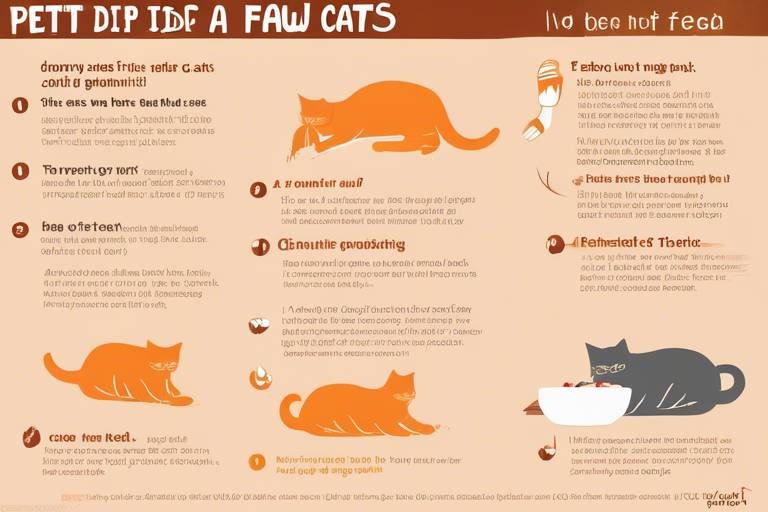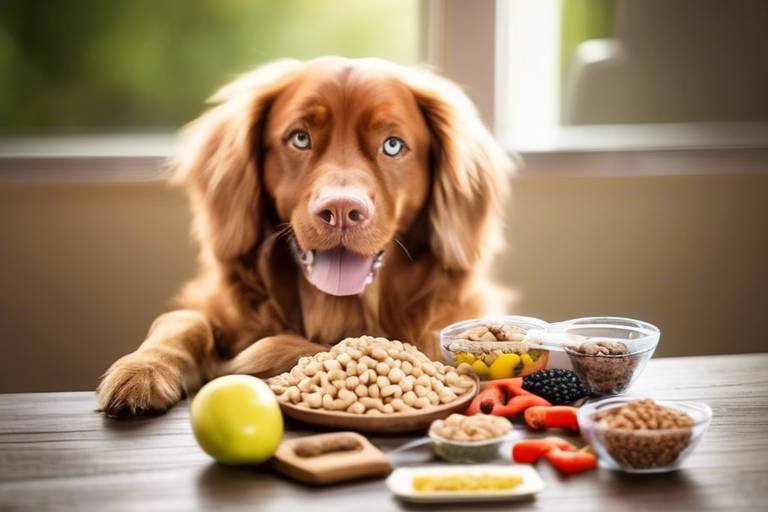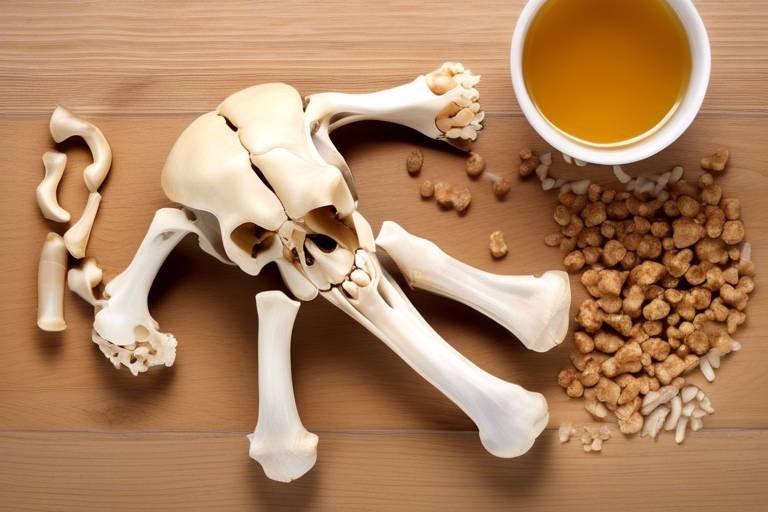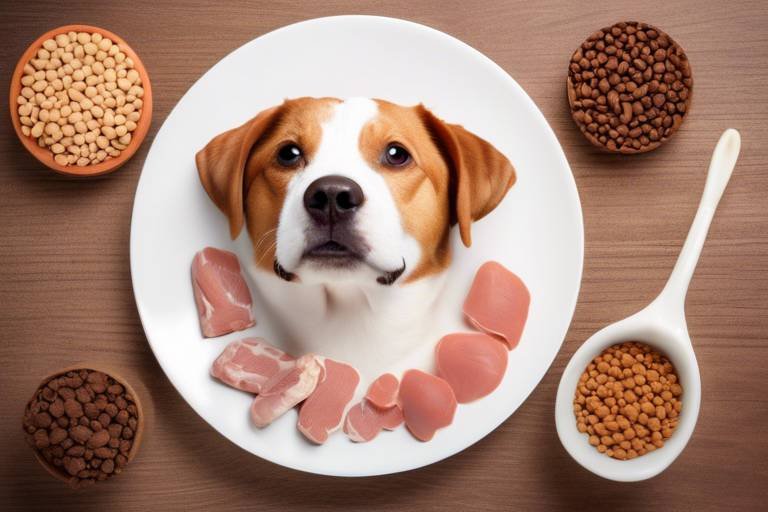The Importance of Regular Nutritional Evaluations for Pets
As pet owners, we often find ourselves caught up in the whirlwind of daily routines, from morning walks to evening playtime. But amidst all the hustle and bustle, one aspect that deserves our undivided attention is our furry friends' nutrition. Just like humans, pets require a balanced diet to thrive, and regular nutritional evaluations are essential for ensuring their health and happiness. Imagine your pet as a finely tuned machine; every part must work harmoniously for optimal performance. If one component is off, the whole system can falter. This is where nutritional assessments come into play.
Routine evaluations allow us to dive deep into our pets' dietary needs, uncovering any hidden deficiencies or imbalances that could lead to long-term health issues. Think of it as a health check-up, but for their diet! By keeping a close eye on what they consume, we can prevent problems before they arise, ensuring our pets lead vibrant, energetic lives. Regular assessments are not just a good idea; they are a cornerstone of responsible pet ownership.
Moreover, the impact of proper nutrition extends beyond just physical health. A well-nourished pet is often a happy pet, exhibiting improved mood, energy levels, and even behavior. It’s like giving them a key to unlock their potential! So, let’s explore why these nutritional evaluations are vital, how they can enhance your pet's well-being, and what best practices you can adopt to ensure your furry companion is receiving the best care possible.
Before we dive into the benefits of regular nutritional evaluations, it's crucial to have a solid understanding of pet nutrition itself. Just as a car needs the right fuel to run smoothly, our pets require specific nutrients to maintain their health. Different types of pets have varying nutritional needs, influenced by factors such as age, breed, and health conditions. For instance, puppies need a diet rich in protein for growth, while senior dogs may require fewer calories to prevent obesity.
Key nutrients such as proteins, fats, carbohydrates, vitamins, and minerals each play a unique role in your pet's health. Proteins are essential for muscle development, while fats provide energy and support skin and coat health. Carbohydrates, often overlooked, serve as a vital energy source. Vitamins and minerals are crucial for various bodily functions, from immune support to bone health. Understanding these needs is the first step toward ensuring your pet receives a balanced diet.
Now that we have a grasp of pet nutrition, let's discuss the myriad benefits of regular nutritional evaluations. These assessments serve as a proactive approach to pet care, identifying dietary deficiencies and preventing obesity before they become significant issues. Imagine being able to catch a potential problem before it escalates—this is the power of nutritional evaluations!
One of the primary advantages is the ability to tailor diets to individual needs. Every pet is unique, and their dietary requirements can change throughout their lives. A routine evaluation allows pet owners to adjust their pets' diets accordingly, ensuring they receive the right nutrients at every stage of life. This personalized approach can lead to improved energy levels, better coat conditions, and enhanced overall health.
Understanding common nutritional deficiencies in pets is crucial for making informed decisions. Without regular evaluations, it can be easy to overlook subtle signs that your pet may not be getting the nutrients they need. For instance, a lack of essential fatty acids can lead to dry skin and a dull coat, while insufficient vitamins can result in weakened immune systems. Regular assessments help identify these deficiencies early on, allowing you to make necessary dietary adjustments.
Here are some prevalent nutritional deficiencies seen in pets:
- Vitamin A: Essential for vision and immune function.
- Calcium: Crucial for bone health and muscle function.
- Omega-3 Fatty Acids: Important for skin and coat health.
- Fiber: Aids in digestion and prevents obesity.
If left unaddressed, these deficiencies can lead to serious health issues. Therefore, recognizing the signs of nutritional imbalance is vital for timely intervention.
Pet owners should be vigilant for symptoms that may indicate dietary issues. Some common signs include:
- Weight loss or gain
- Changes in coat condition (e.g., dullness, excessive shedding)
- Digestive issues (e.g., diarrhea, constipation)
- Low energy or lethargy
By keeping an eye out for these signs, you can ensure your pet receives the right care and nutrition they need to thrive.
Every pet is unique, and their dietary needs can vary greatly based on factors like age, breed, and health conditions. Regular nutritional evaluations are essential for developing personalized nutrition plans that cater to these individual needs. For example, a young, active dog may require a different diet than an older, less active one. By understanding these differences, you can provide your pet with the best possible diet tailored specifically for them.
Selecting an appropriate diet for your pet can be overwhelming, especially with so many options available. However, regular nutritional evaluations can simplify this process. By understanding your pet's specific needs, you can make informed decisions that lead to better health outcomes.
Deciphering pet food labels is vital for making informed choices. Look for high-quality ingredients and ensure that the food meets the nutritional standards set by organizations such as the Association of American Feed Control Officials (AAFCO). Understanding the label can help you identify if the food is suitable for your pet’s specific dietary requirements.
Veterinarians play a key role in nutritional evaluations. They can provide valuable insights into your pet's dietary needs and recommend appropriate food options. Don’t hesitate to involve your vet in dietary decisions; their expertise can ensure a balanced and healthy diet for your beloved pet.
Q: How often should I have my pet's nutrition evaluated?
A: Ideally, you should evaluate your pet's nutrition at least once a year, or more frequently if they have specific health concerns or dietary changes.
Q: What should I look for in pet food labels?
A: Look for high-quality ingredients, a clear list of nutrients, and ensure it meets AAFCO standards for your pet's life stage.
Q: Can I change my pet's diet without consulting a vet?
A: While some changes can be made at home, it’s always best to consult with a veterinarian, especially for significant dietary shifts.

Understanding Pet Nutrition
A solid foundation in pet nutrition is essential for ensuring optimal health. Just like we humans need a balanced diet to thrive, our furry friends require the right mix of nutrients to stay happy and healthy. Understanding the basic nutritional requirements for various types of pets is crucial, as it sets the stage for their overall well-being. Pets, whether they are dogs, cats, or even exotic animals, have specific dietary needs that must be met to promote longevity and vitality.
To break it down, pets need a combination of proteins, fats, carbohydrates, vitamins, and minerals. Each of these nutrients plays a vital role in maintaining their health. For instance, proteins are essential for growth, repair, and overall energy. Fats provide a concentrated source of energy and are crucial for maintaining healthy skin and a shiny coat. Carbohydrates, while not as critical, offer a quick energy source and aid in digestion. Furthermore, vitamins and minerals support various bodily functions, from bone health to immune system support.
However, the specific needs can vary significantly depending on the type of pet. For example, dogs are omnivores and can thrive on a mix of meat and plant-based foods, while cats are obligate carnivores, meaning they need a diet primarily composed of meat. Understanding these differences is key to providing the best nutrition for your pet.
To give you a clearer picture, here’s a quick overview of the basic nutritional needs for common pets:
| Pet Type | Primary Nutritional Needs | Key Nutrients |
|---|---|---|
| Dogs | Omnivorous diet | Proteins, Fats, Carbohydrates, Vitamins, Minerals |
| Cats | Carnivorous diet | High Protein, Fats, Minimal Carbohydrates, Vitamins, Minerals |
| Rabbits | Herbivorous diet | High Fiber, Low Protein, Vitamins, Minerals |
It's not just about what they eat, but also how much they eat. Portion control is equally important, as overfeeding can lead to obesity, which is a growing concern among pets today. Regular nutritional evaluations can help pet owners determine the right amounts based on their pet's age, weight, activity level, and health status. In essence, understanding pet nutrition is not just a matter of feeding them; it’s about feeding them right.
Lastly, it's essential to remember that every pet is unique. Factors such as age, breed, and existing health conditions can influence their dietary requirements. Therefore, keeping up with nutritional knowledge and being proactive about your pet's diet can make a world of difference in their health and happiness. So, the next time you’re at the pet store, take a moment to reflect on what’s in that bag of kibble or can of food. Your pet’s health depends on it!

Benefits of Nutritional Evaluations
When it comes to our beloved pets, their health and happiness are often at the forefront of our minds. One of the most effective ways to ensure they thrive is through regular nutritional evaluations. Just like humans, pets require a balanced diet tailored to their unique needs. But why should you invest time and resources into these assessments? The benefits are manifold and can significantly enhance your pet's quality of life.
First and foremost, nutritional evaluations help in identifying dietary deficiencies. Pets can suffer from a lack of essential nutrients, which can lead to a host of health issues. For example, a deficiency in vitamins such as A, D, or E can result in skin problems, weakened immune systems, and even growth issues in younger animals. Regular evaluations allow pet owners to pinpoint these deficiencies early, enabling timely dietary adjustments that can prevent serious health complications.
Moreover, these evaluations play a crucial role in preventing obesity, which has become a significant concern in pet health today. Overweight pets are at a higher risk for various diseases, including diabetes, arthritis, and heart problems. By regularly assessing their nutritional intake, pet owners can ensure their furry friends maintain a healthy weight. This proactive approach not only enhances their lifespan but also improves their overall quality of life. Imagine your pet bounding around with energy instead of sluggishly lounging on the couch!
Another significant advantage of nutritional evaluations is the ability to tailor diets to individual needs. Every pet is unique, and their dietary requirements can vary based on factors such as age, breed, activity level, and existing health conditions. For instance, a senior dog may require a diet lower in calories but higher in fiber to aid digestion, while a growing puppy needs more protein for muscle development. Evaluations provide the insights necessary to create a personalized nutrition plan that caters to these specific needs, ensuring that each pet receives the right balance of nutrients.
Additionally, regular nutritional assessments can help pet owners stay informed about the latest trends and research in pet nutrition. The pet food industry is constantly evolving, with new products and formulations emerging regularly. By engaging in nutritional evaluations, you can keep up with these changes and make better-informed decisions about what to feed your pet. This ongoing education is vital for ensuring that your pet's diet remains optimal as new information becomes available.
Finally, by committing to regular nutritional evaluations, you’re not just investing in your pet’s diet but also in their overall well-being. A well-nourished pet is often a happier pet, leading to improved behavior, increased energy levels, and a stronger bond between you and your furry companion. After all, a healthy pet is a happy pet, and who doesn't want to see their beloved animal thriving?
- How often should I have my pet's nutrition evaluated?
It’s generally recommended to have a nutritional evaluation at least once a year, but if your pet has specific health issues or dietary concerns, more frequent assessments may be necessary. - Can I perform a nutritional evaluation at home?
While you can monitor your pet's eating habits and overall health, it’s best to consult with a veterinarian for a comprehensive evaluation to ensure all nutritional needs are met. - What are the signs that my pet might need a nutritional evaluation?
Look for signs such as weight changes, lethargy, poor coat condition, or digestive issues. If you notice any of these symptoms, it may be time for an evaluation.
Identifying Nutritional Deficiencies
Recognizing nutritional deficiencies in your pet is like being a detective on a mission—every clue counts! Just as we need a balanced diet to thrive, our furry friends require the right nutrients to live their best lives. But how do you know if your pet is missing out on essential vitamins and minerals? Well, it’s all about being observant and informed. Regular nutritional evaluations can be your best ally in pinpointing these deficiencies before they turn into significant health issues.
First off, let’s talk about what nutritional deficiencies might look like. A pet that isn’t getting enough of the right nutrients may show signs such as lethargy, poor coat condition, or even digestive problems. For instance, if your dog’s coat appears dull and brittle, it could indicate a lack of essential fatty acids or vitamins. Similarly, if your cat is experiencing frequent gastrointestinal upset, it may be a sign of inadequate fiber or specific nutrient imbalances. Understanding these signs is crucial for timely intervention.
So, what exactly should you be on the lookout for? Here are some common symptoms that might hint at nutritional deficiencies:
- Weight Loss: Unexplained weight loss can be a red flag, suggesting that your pet isn't getting enough calories or nutrients.
- Changes in Coat Quality: A shiny, healthy coat is often a sign of good nutrition, while a dry, flaky coat may indicate deficiencies.
- Behavioral Changes: If your pet seems unusually lethargic or irritable, it might be due to a lack of essential nutrients.
By conducting regular nutritional evaluations, you can gather valuable insights into your pet’s diet. These assessments help you identify specific deficiencies and understand how they could impact your pet's health. For example, a simple blood test can reveal levels of certain vitamins and minerals, allowing you to adjust their diet accordingly. It's like having a personalized roadmap to optimal health!
Furthermore, many pet owners might not realize that some pets have unique dietary needs based on their breed, age, or health conditions. For instance, senior dogs might require more protein to maintain muscle mass, while puppies need a diet rich in calcium for bone development. Regular evaluations can help tailor their diets to meet these specific needs, ensuring they get the right balance of nutrients.
To sum it up, identifying nutritional deficiencies in pets is not just about observing symptoms; it’s about being proactive. By scheduling regular nutritional evaluations and staying informed about your pet's dietary needs, you can help your furry friend live a longer, healthier, and happier life. After all, a well-nourished pet is a happy pet!
Q: How often should I have my pet's nutrition evaluated?
A: It's generally recommended to conduct nutritional evaluations at least once a year, but pets with specific health issues may need more frequent assessments.
Q: Can I do nutritional evaluations at home?
A: While you can monitor your pet's weight and general health at home, it’s best to consult with a veterinarian for professional evaluations that include blood tests and dietary assessments.
Q: What should I do if I suspect my pet has a nutritional deficiency?
A: If you notice any signs of nutritional deficiencies, consult your veterinarian immediately. They can provide guidance and recommend dietary adjustments tailored to your pet's needs.
Common Nutritional Deficiencies
When it comes to our furry friends, understanding common nutritional deficiencies is crucial for their health and happiness. Just like humans, pets require a balanced diet rich in essential nutrients to thrive. However, many pet owners may not realize that their beloved companions could be lacking in key vitamins and minerals. This can lead to a host of health issues that might go unnoticed until they become serious. For instance, Vitamin A is vital for vision and immune function, while Calcium is essential for strong bones and teeth. Without these nutrients, pets can suffer from various ailments, including poor vision, weak bones, and compromised immune systems.
Some of the most prevalent nutritional deficiencies in pets include:
- Vitamin D: Essential for calcium absorption, a deficiency can lead to bone disorders.
- Omega-3 Fatty Acids: Important for skin and coat health, a lack can result in dry skin and excessive shedding.
- Iron: Critical for blood production, iron deficiency can cause anemia, leading to lethargy and weakness.
- Fiber: Essential for digestive health, insufficient fiber can cause constipation and other gastrointestinal issues.
It's not just about the nutrients themselves; it's also about how they interact with each other. For example, a diet that is high in phosphorus but low in calcium can lead to imbalances that affect bone health. This is why it’s essential to provide a well-rounded diet that meets all of your pet’s nutritional needs.
Moreover, the signs of nutritional deficiencies can vary widely among different pets. Some pets may show symptoms like lethargy, changes in appetite, or even behavioral changes, while others may exhibit physical signs such as poor coat condition or dental issues. Regular nutritional evaluations can help identify these deficiencies before they escalate into more serious health problems.
In conclusion, being aware of common nutritional deficiencies is the first step in ensuring your pet's health. By providing a balanced diet and seeking veterinary advice when needed, you can help your furry friend live a long, healthy, and happy life.
Signs of Nutritional Imbalance
Recognizing the signs of nutritional imbalance in your pet is crucial for ensuring their health and happiness. Just like us, pets can experience a range of symptoms when their diet isn't quite right. Have you ever noticed your furry friend acting a bit off? Maybe they're less energetic, or their coat isn’t shining like it used to. These could be subtle hints that something is amiss in their nutritional intake. It's essential to be vigilant and proactive because early detection can lead to better outcomes.
Some common signs of nutritional imbalance include:
- Weight Changes: Sudden weight loss or gain can indicate that your pet’s diet lacks essential nutrients or is too calorie-dense.
- Coat Quality: A dull, dry, or flaky coat can be a sign of deficiencies in fatty acids or other vital nutrients.
- Behavioral Changes: Increased irritability or lethargy may suggest that your pet is not receiving the right balance of nutrients.
- Digestive Issues: Frequent vomiting, diarrhea, or constipation can be linked to dietary problems.
- Dental Problems: Poor dental health can arise from inadequate nutrition, leading to gum disease or tooth decay.
Each of these signs can be a red flag, indicating that your pet's diet needs reevaluation. For instance, if your dog suddenly becomes less playful and seems to lack energy, it might be time to look at their food. On the other hand, if your cat is experiencing frequent hairballs, it could be a signal that their diet isn't providing enough fiber. It's fascinating how much our pets communicate through their behavior, isn't it?
Moreover, the consequences of ignoring these signs can be quite serious. Nutritional imbalances can lead to long-term health issues, making it all the more important to stay alert. By keeping an eye on your pet’s habits and physical condition, you can catch any potential problems early. Remember, a balanced diet is foundational to a healthy life, just as a well-tuned engine is crucial for a car's performance. If you notice any of these symptoms, consider conducting a nutritional evaluation with your veterinarian. They can help you tailor a diet that meets your pet’s unique needs and ensures they thrive.
Q: How often should I have my pet's nutrition evaluated?
A: It’s recommended to have a nutritional evaluation at least once a year, but pets with specific health issues may require more frequent assessments.
Q: What should I do if I notice signs of nutritional imbalance?
A: If you notice any signs of nutritional imbalance, consult your veterinarian as soon as possible. They can help identify the issue and suggest dietary changes.
Q: Can I change my pet's diet on my own?
A: While you can make dietary changes, it’s best to consult with your veterinarian to ensure the new diet meets your pet’s specific nutritional needs.
Q: Are there specific diets for different breeds or ages of pets?
A: Yes, different breeds and ages have unique nutritional requirements. Always choose a diet that is appropriate for your pet's life stage and breed.
Tailoring Diets for Individual Needs
When it comes to our furry companions, one size definitely does not fit all. Just like humans, pets have unique dietary needs that vary based on a myriad of factors such as age, breed, weight, and health conditions. For instance, a playful puppy has very different nutritional requirements compared to a senior dog who may have specific health issues. Tailoring a diet to meet these individual needs is essential for ensuring that your pet thrives.
Consider this: if you were to eat the same meal every day, without any regard for your changing nutritional needs, how would you feel? Probably not great! Pets experience similar issues when their diets are not adjusted according to their life stages or health status. A well-balanced diet that caters to their specific requirements can lead to improved energy levels, better digestion, and even a shinier coat.
To effectively tailor your pet's diet, it’s crucial to start with a thorough nutritional evaluation. This assessment should consider factors such as:
- Life Stage: Puppies and kittens need more protein and calories to support their growth, while senior pets may require fewer calories but more fiber.
- Breed: Some breeds are prone to specific health issues that can be managed with the right diet.
- Activity Level: An active pet may require more calories compared to a couch potato.
- Health Conditions: Pets with allergies, diabetes, or kidney disease need specialized diets to manage their conditions effectively.
After identifying these factors, you can then work on formulating a personalized diet plan. This might involve choosing specific commercial pet foods designed for their life stage or even preparing homemade meals that meet their dietary needs. However, it’s important to ensure that any homemade meals are balanced and include all necessary nutrients. Consulting with a veterinarian or a pet nutritionist can provide valuable insights into what constitutes a balanced diet for your pet.
Moreover, regular follow-ups and evaluations are key to adjusting the diet as needed. As pets grow older or if their health changes, their dietary needs may shift. By staying proactive and attentive to these changes, you can ensure that your beloved pet remains healthy and happy for years to come. Remember, the goal is to create a diet that not only keeps them fit but also enhances their overall quality of life.

Choosing the Right Diet
When it comes to for your furry friend, the options can be overwhelming. With so many brands, flavors, and formulations available, how do you ensure that you're making the best choice for your pet? It’s essential to recognize that not all pet foods are created equal, and what works for one pet might not work for another. This is where nutritional evaluations come into play, acting as a guiding light in the complex world of pet nutrition.
First and foremost, understanding your pet's specific needs is crucial. Factors such as age, breed, activity level, and any existing health conditions can significantly influence their dietary requirements. For instance, a sprightly puppy has different nutritional needs compared to a senior dog. Similarly, a cat with kidney issues may require a special diet tailored to manage that condition. Therefore, it’s vital to consider these aspects when selecting food.
One of the best ways to start is by consulting with a veterinarian. Your vet can provide invaluable insights into your pet's health and recommend dietary adjustments based on their unique profile. They can help you navigate through the myriad of options and suggest brands that prioritize high-quality ingredients over fillers. Remember, a diet rich in protein, healthy fats, and essential vitamins and minerals is fundamental for your pet's health.
Next, let’s delve into the importance of reading pet food labels. Understanding what’s in the food you’re buying is key to making informed decisions. For example, look for products that list a specific meat as the first ingredient, as this indicates a higher protein content. Avoid foods that have vague terms like "meat by-products," which can be less nutritious. Here’s a quick breakdown of what to look for on a pet food label:
| Label Element | What to Look For |
|---|---|
| Protein Source | Specific meat (e.g., chicken, beef) should be listed first. |
| Grains | Whole grains like brown rice or oats are better than fillers. |
| Fats | Named fats (e.g., chicken fat) are preferable for healthy skin and coat. |
| Vitamins & Minerals | Look for added vitamins and minerals to support overall health. |
Moreover, consider your pet’s preferences and any food sensitivities they may have. If your pet has a sensitive stomach or allergies, it’s essential to choose a diet that addresses these issues. Many brands offer specialized formulas for pets with sensitivities, which can make a significant difference in their overall well-being.
Finally, remember that transitioning to a new diet should be done gradually. Sudden changes can upset your pet's digestive system, leading to discomfort. A general rule of thumb is to introduce the new food over a week, mixing it with their current food to allow their system to adjust. Start with a small amount of the new food, gradually increasing it while decreasing the old food until the transition is complete.
In conclusion, choosing the right diet for your pet is not just about picking up any bag of kibble off the shelf. It requires careful consideration of their specific needs, a thorough understanding of pet food labels, and consultation with your veterinarian. By taking the time to evaluate your pet's dietary requirements, you can ensure they live a long, healthy, and happy life.
- How often should I evaluate my pet's diet? It's recommended to assess your pet's diet every 6 to 12 months or whenever you notice changes in their health or behavior.
- Can I feed my pet human food? Some human foods are safe for pets, but it's crucial to know which ones are appropriate and to avoid those that are toxic.
- What should I do if my pet refuses to eat their new food? If your pet is resistant to new food, try mixing it with their old food or warming it slightly to enhance its aroma.
Understanding Pet Food Labels
When it comes to choosing the right food for your furry friend, understanding pet food labels is crucial. Just like reading the nutrition facts on your own food packaging, pet food labels provide essential information that can help you make informed decisions about your pet's diet. But let’s be honest, navigating these labels can feel like deciphering a secret code at times! So, let’s break it down into manageable pieces.
First and foremost, the ingredient list is your starting point. Ingredients are listed by weight, meaning the first ingredient is the primary component of the food. Ideally, you want to see a high-quality protein source, such as chicken, beef, or fish, listed first. But don’t stop there! Check for the presence of whole grains or vegetables that provide necessary fiber and nutrients. Ingredients like corn and soy can often be fillers that don’t offer much nutritional value.
Next up is the guaranteed analysis section. This is where you'll find the minimum percentages of protein and fat, as well as the maximum percentages of fiber and moisture. It’s essential to compare these values to ensure your pet is getting a balanced diet. For example, if you’re feeding a high-energy dog, you’ll want a food that has a higher protein and fat content to support their activity level.
Another key component is the AAFCO statement. The Association of American Feed Control Officials (AAFCO) sets standards for pet food. Look for a statement that indicates the food is complete and balanced for your pet’s specific life stage, whether it be puppy, adult, or senior. This little phrase can make a big difference in ensuring your pet gets the right nutrients.
Lastly, don’t forget to check for additives such as vitamins, minerals, and probiotics. These can enhance your pet's health and digestion. However, be wary of foods that list an overwhelming number of synthetic additives; sometimes, less is more when it comes to your pet’s diet.
To sum it all up, understanding pet food labels is about being an informed pet parent. Here’s a quick recap of what to look for:
- High-quality protein as the first ingredient
- Guaranteed analysis for nutritional content
- AACFO statement for completeness and balance
- Minimal synthetic additives for better health
By taking the time to understand these labels, you’re not just choosing food; you’re investing in your pet’s health and happiness. So the next time you’re in the pet aisle, remember: knowledge is power! Make those labels work for you, and give your pet the best possible nutrition.
Consulting with Veterinarians
When it comes to your furry friend's health, is not just a good idea; it’s essential! Veterinarians are like the superheroes of pet care, equipped with the knowledge and tools necessary to ensure that your pet's nutritional needs are met. They can provide tailored advice that considers your pet's unique health profile, lifestyle, and dietary preferences. Imagine trying to navigate a maze without a map—this is what it feels like for many pet owners when it comes to choosing the right diet without professional guidance.
Veterinarians can help you understand the specific dietary requirements of your pet based on factors such as age, breed, weight, and any existing health conditions. For example, a puppy has different nutritional needs than a senior dog, and a cat with diabetes requires a specialized diet. By conducting thorough nutritional evaluations, veterinarians can identify any deficiencies or imbalances that may be affecting your pet's health. This proactive approach can prevent the development of serious health issues down the line.
Moreover, many pet owners are often overwhelmed by the plethora of pet food options available on the market. With so many brands, flavors, and formulations, how do you know what’s best for your pet? This is where your vet's expertise shines. They can help you decode those complex pet food labels, ensuring that you choose a diet that is not only nutritionally adequate but also aligned with your pet's specific needs. For instance, they can help you understand the importance of ingredients like protein, fats, carbohydrates, vitamins, and minerals and how they contribute to your pet's overall health.
In addition to dietary recommendations, veterinarians can also monitor your pet's weight and body condition score. This ongoing assessment is crucial because it helps in making necessary adjustments to your pet's diet over time. Remember, what works for your pet today might not be suitable a year from now. Regular check-ups with your vet can help you stay ahead of any potential issues, ensuring that your pet remains healthy and vibrant.
Finally, don’t hesitate to ask questions during your vet visits! Whether it’s about the best food brands, how to transition your pet to a new diet, or understanding food allergies, your veterinarian is there to help. They can provide insights that are tailored to your pet's unique situation, making your role as a pet parent a lot easier. After all, a well-informed owner is a confident owner, and that confidence translates into better care for your beloved pet.
- How often should I consult my veterinarian about my pet's diet? It's advisable to have a nutritional evaluation at least once a year or more frequently if your pet has specific health concerns.
- Can I rely solely on pet food labels for nutrition information? While labels are helpful, consulting with your veterinarian ensures you understand the nutritional adequacy of the food for your pet's specific needs.
- What should I do if my pet has food allergies? Consult your veterinarian for a proper diagnosis and dietary recommendations tailored to your pet's allergies.
Frequently Asked Questions
- Why are regular nutritional evaluations important for my pet?
Regular nutritional evaluations are crucial because they help identify any dietary deficiencies and ensure your pet is getting the right balance of nutrients. Just like us, pets can suffer from health issues if their diet is lacking essential vitamins and minerals. By keeping tabs on their nutrition, you can enhance their overall well-being and potentially extend their lifespan.
- What are the common signs of nutritional deficiencies in pets?
Some common signs of nutritional deficiencies include lethargy, poor coat condition, weight loss, and digestive issues. If you notice any unusual behavior or physical changes in your pet, it might be time for a nutritional evaluation. Think of it like a red flag waving—it's your pet's way of saying, "Hey, something's not right!"
- How can I tailor my pet's diet to their individual needs?
Tailoring your pet's diet involves understanding their specific needs based on factors like age, breed, and any existing health conditions. A nutritional evaluation can provide insights into what your pet requires. It's similar to finding the perfect outfit; you want something that fits just right and makes them feel good!
- What should I look for when reading pet food labels?
When reading pet food labels, focus on the ingredient list and the guaranteed analysis section. Look for high-quality protein sources, essential fatty acids, and a balance of vitamins and minerals. Avoid foods with vague terms like "meat by-products" and those loaded with fillers. It’s like shopping for groceries; you want to know what’s actually in the bag!
- How often should I consult my veterinarian about my pet's diet?
It's a good idea to consult your veterinarian at least once a year for a nutritional evaluation, especially if your pet is experiencing changes in weight, energy levels, or health. Your vet can help you adjust their diet as needed, ensuring they stay healthy and happy. Think of your vet as your pet's personal nutritionist!
- Can I change my pet's diet without consulting a vet?
While you can make some minor adjustments based on your pet's preferences, it's always best to consult with a veterinarian before making significant changes to their diet. Pets have unique nutritional requirements, and a vet can help you avoid any potential pitfalls. It’s like trying a new recipe; you want to make sure you have the right ingredients!



















